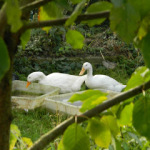Reading Wright
I’ve just read Richard Wright’s memoir, Black Boy, about how discovering books changed his life in oppressive Mississippi. “I hungered for books,” he writes, “new ways of looking and seeing. Reading grew into a passion. It had been only through books–vicarious cultural transfusions–that I had managed to keep myself alive. From them, I felt touching my face a tinge of warmth from an unseen light.”
It reminded me of my own discovery of the excitement of literature as a teenager in India, of how books were a drug, an enchantment , a dream I could live in for days. Like an oyster cleaver, they opened up the world, its strangeness and richness.
I was carefree then. Today literature offers not only the gift of enlargement, but of self-forgetfulness–leaving behind the world of chores, bills, and careers to enter another mind, another universe, to leave enlarged. Especially when we practice what Emerson calls creative reading: a margin-scribbling, feisty , mental dialogue with the writer.
And yet when I walk around the neighbourhood at evening, I notice neighbors–who sigh they have no time to read–sit mesmerized by a flickering screen. Why?
Read my new memoir: Rosaries, Reading, Secrets: A Catholic Childhood in India (US) or UK.
Connect on Facebook: https://www.facebook.com/anitamathiaswriter/
Instagram: https://www.instagram.com/anita.mathias/
Twitter: https://twitter.com/AnitaMathias1
My book of essays: Wandering Between Two Worlds (US) or UK






